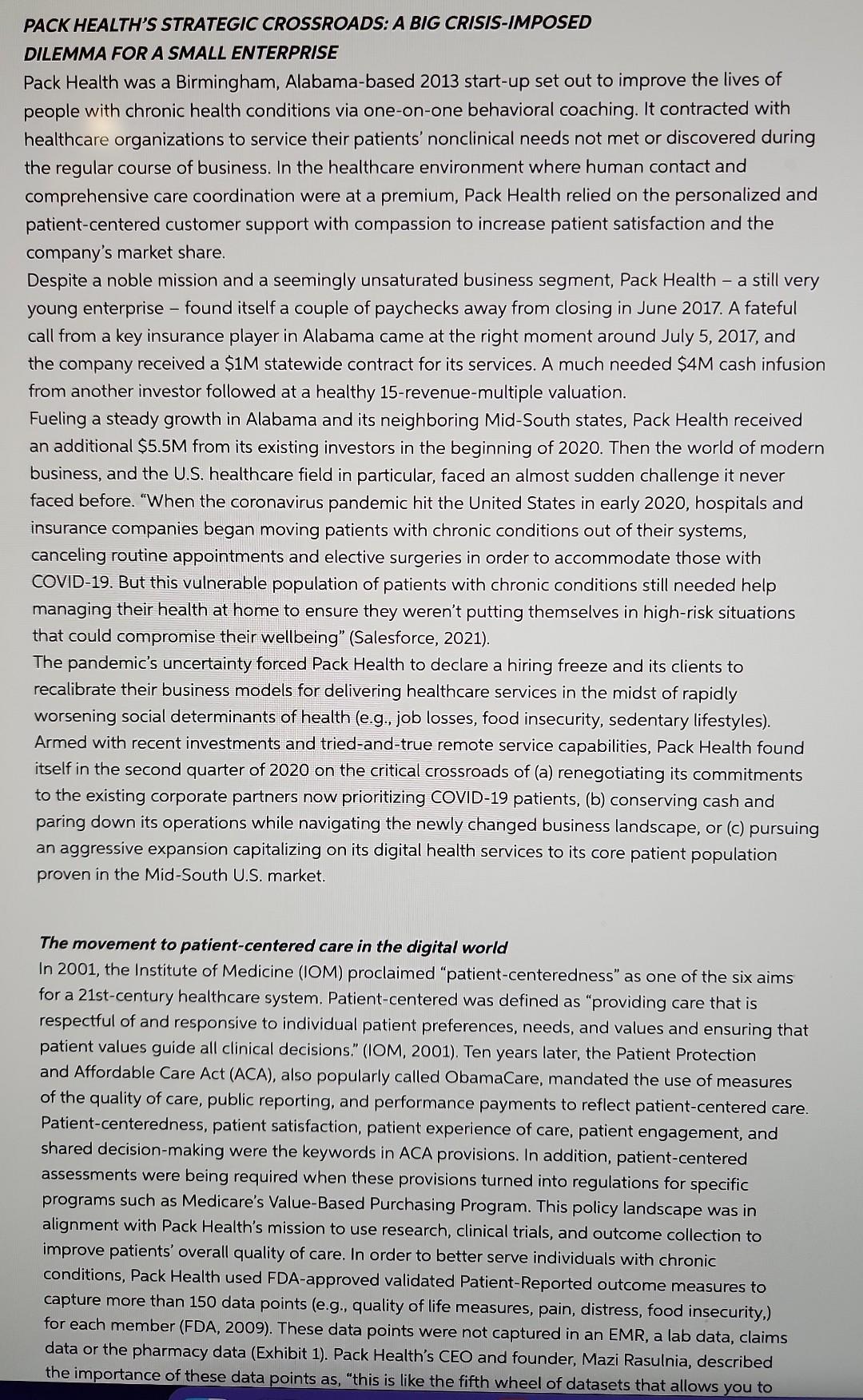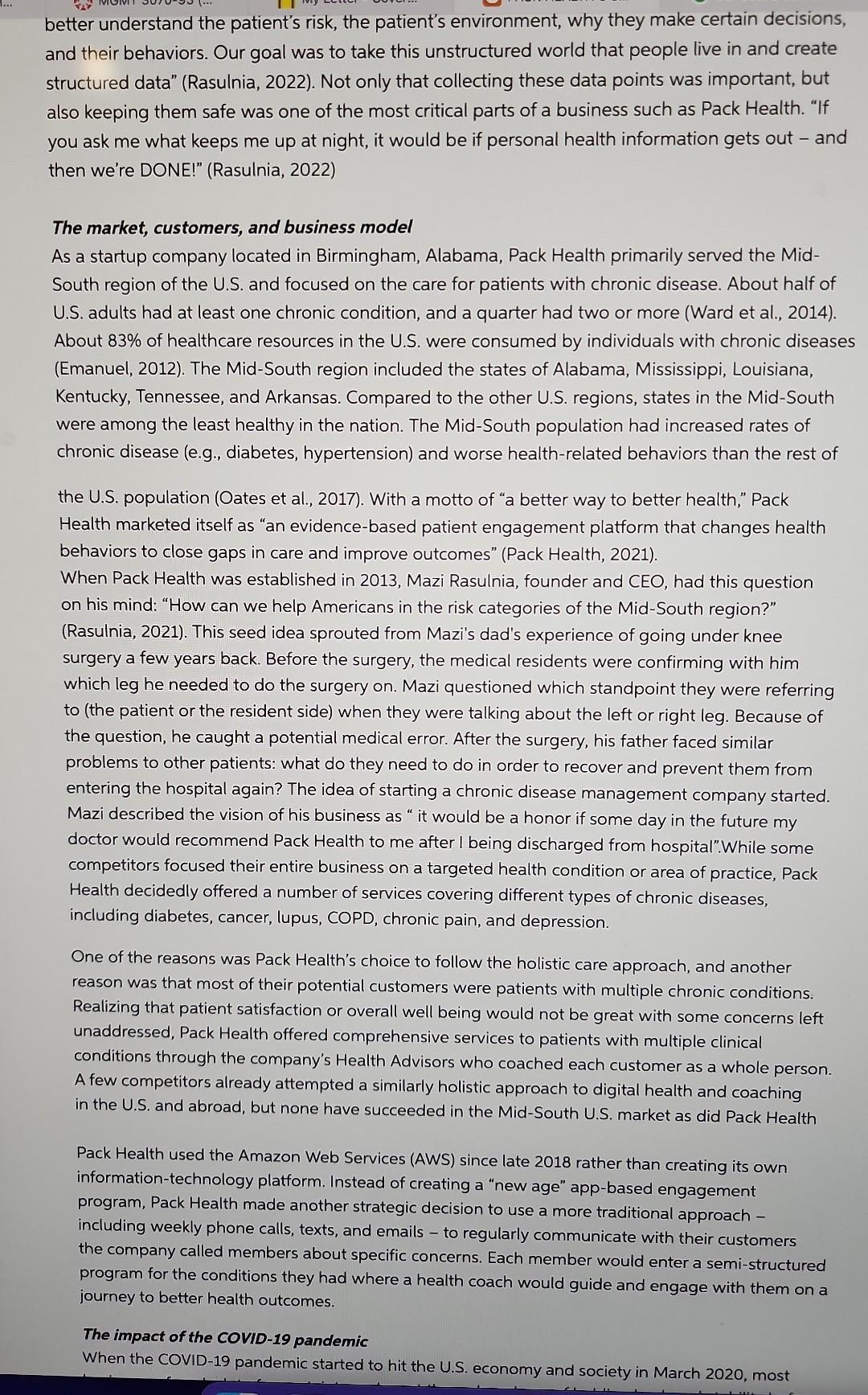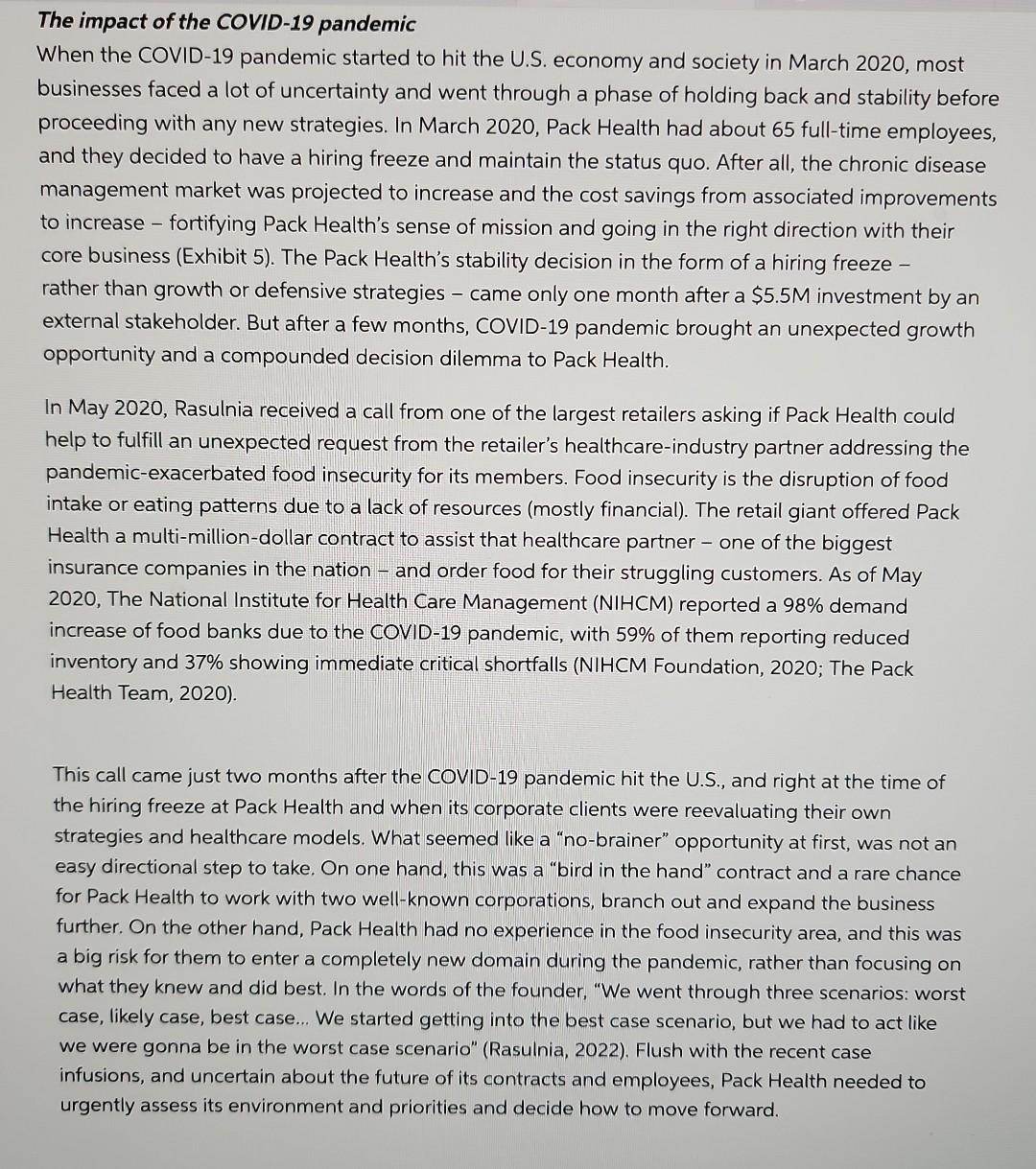Answered step by step
Verified Expert Solution
Question
1 Approved Answer
question=> Conduct a scenario analysis for the 3 scenario Pack health was facing. PACK HEALTH'S STRATEGIC CROSSROADS: A BIG CRISIS-IMPOSED DILEMMA FOR A SMALL ENTERPRISE



question=> Conduct a scenario analysis for the 3 scenario Pack health was facing.
PACK HEALTH'S STRATEGIC CROSSROADS: A BIG CRISIS-IMPOSED DILEMMA FOR A SMALL ENTERPRISE Pack Health was a Birmingham, Alabama-based 2013 start-up set out to improve the lives of people with chronic health conditions via one-on-one behavioral coaching. It contracted with healthcare organizations to service their patients' nonclinical needs not met or discovered during the regular course of business. In the healthcare environment where human contact and comprehensive care coordination were at a premium, Pack Health relied on the personalized and patient-centered customer support with compassion to increase patient satisfaction and the company's market share. Despite a noble mission and a seemingly unsaturated business segment, Pack Health - a still very young enterprise - found itself a couple of paychecks away from closing in June 2017. A fateful call from a key insurance player in Alabama came at the right moment around July 5, 2017, and the company received a $1M statewide contract for its services. A much needed $4M cash infusion from another investor followed at a healthy 15 -revenue-multiple valuation. Fueling a steady growth in Alabama and its neighboring Mid-South states, Pack Health received an additional $5.5M from its existing investors in the beginning of 2020 . Then the world of modern business, and the U.S. healthcare field in particular, faced an almost sudden challenge it never faced before. "When the coronavirus pandemic hit the United States in early 2020, hospitals and insurance companies began moving patients with chronic conditions out of their systems, canceling routine appointments and elective surgeries in order to accommodate those with COVID-19. But this vulnerable population of patients with chronic conditions still needed help managing their health at home to ensure they weren't putting themselves in high-risk situations that could compromise their wellbeing" (Salesforce, 2021). The pandemic's uncertainty forced Pack Health to declare a hiring freeze and its clients to recalibrate their business models for delivering healthcare services in the midst of rapidly worsening social determinants of health (e.g., job losses, food insecurity, sedentary lifestyles). Armed with recent investments and tried-and-true remote service capabilities, Pack Health found itself in the second quarter of 2020 on the critical crossroads of (a) renegotiating its commitments to the existing corporate partners now prioritizing COVID-19 patients, (b) conserving cash and paring down its operations while navigating the newly changed business landscape, or (c) pursuing an aggressive expansion capitalizing on its digital health services to its core patient population proven in the Mid-South U.S. market. The movement to patient-centered care in the digital world In 2001, the Institute of Medicine (IOM) proclaimed "patient-centeredness" as one of the six aims for a 21st-century healthcare system. Patient-centered was defined as "providing care that is respectful of and responsive to individual patient preferences, needs, and values and ensuring that patient values guide all clinical decisions." (IOM, 2001). Ten years later, the Patient Protection and Affordable Care Act (ACA), also popularly called ObamaCare, mandated the use of measures of the quality of care, public reporting, and performance payments to reflect patient-centered care. Patient-centeredness, patient satisfaction, patient experience of care, patient engagement, and shared decision-making were the keywords in ACA provisions. In addition, patient-centered assessments were being required when these provisions turned into regulations for specific programs such as Medicare's Value-Based Purchasing Program. This policy landscape was in alignment with Pack Health's mission to use research, clinical trials, and outcome collection to improve patients' overall quality of care. In order to better serve individuals with chronic conditions, Pack Health used FDA-approved validated Patient-Reported outcome measures to capture more than 150 data points (e.g., quality of life measures, pain, distress, food insecurity,) for each member (FDA, 2009). These data points were not captured in an EMR, a lab data, claims data or the pharmacy data (Exhibit 1). Pack Health's CEO and founder, Mazi Rasulnia, described the importance of these data points as, "this is like the fifth wheel of datasets that allows you to better understand the patient's risk, the patient's environment, why they make certain decisions, and their behaviors. Our goal was to take this unstructured world that people live in and create structured data" (Rasulnia, 2022). Not only that collecting these data points was important, but also keeping them safe was one of the most critical parts of a business such as Pack Health. "If you ask me what keeps me up at night, it would be if personal health information gets out - and then we're DONE!" (Rasulnia, 2022) The market, customers, and business model As a startup company located in Birmingham, Alabama, Pack Health primarily served the MidSouth region of the U.S. and focused on the care for patients with chronic disease. About half of U.S. adults had at least one chronic condition, and a quarter had two or more (Ward et al., 2014). About 83% of healthcare resources in the U.S. were consumed by individuals with chronic diseases (Emanuel, 2012). The Mid-South region included the states of Alabama, Mississippi, Louisiana, Kentucky, Tennessee, and Arkansas. Compared to the other U.S. regions, states in the Mid-South were among the least healthy in the nation. The Mid-South population had increased rates of chronic disease (e.g., diabetes, hypertension) and worse health-related behaviors than the rest of the U.S. population (Oates et al., 2017). With a motto of "a better way to better health," Pack Health marketed itself as "an evidence-based patient engagement platform that changes health behaviors to close gaps in care and improve outcomes" (Pack Health, 2021). When Pack Health was established in 2013, Mazi Rasulnia, founder and CEO, had this question on his mind: "How can we help Americans in the risk categories of the Mid-South region?" (Rasulnia, 2021). This seed idea sprouted from Mazi's dad's experience of going under knee surgery a few years back. Before the surgery, the medical residents were confirming with him which leg he needed to do the surgery on. Mazi questioned which standpoint they were referring to (the patient or the resident side) when they were talking about the left or right leg. Because of the question, he caught a potential medical error. After the surgery, his father faced similar problems to other patients: what do they need to do in order to recover and prevent them from entering the hospital again? The idea of starting a chronic disease management company started. Mazi described the vision of his business as "it would be a honor if some day in the future my doctor would recommend Pack Health to me after I being discharged from hospital". While some competitors focused their entire business on a targeted health condition or area of practice, Pack Health decidedly offered a number of services covering different types of chronic diseases, including diabetes, cancer, lupus, COPD, chronic pain, and depression. One of the reasons was Pack Health's choice to follow the holistic care approach, and another reason was that most of their potential customers were patients with multiple chronic conditions. Realizing that patient satisfaction or overall well being would not be great with some concerns left unaddressed, Pack Health offered comprehensive services to patients with multiple clinical conditions through the company's Health Advisors who coached each customer as a whole person. A few competitors already attempted a similarly holistic approach to digital health and coaching in the U.S. and abroad, but none have succeeded in the Mid-South U.S. market as did Pack Health Pack Health used the Amazon Web Services (AWS) since late 2018 rather than creating its own information-technology platform. Instead of creating a "new age" app-based engagement program, Pack Health made another strategic decision to use a more traditional approach including weekly phone calls, texts, and emails - to regularly communicate with their customers the company called members about specific concerns. Each member would enter a semi-structured program for the conditions they had where a health coach would guide and engage with them on a journey to better health outcomes. The impact of the COVID-19 pandemic When the COVID-19 pandemic started to hit the U.S. economy and society in March 2020, most The impact of the COVID-19 pandemic When the COVID-19 pandemic started to hit the U.S. economy and society in March 2020, most businesses faced a lot of uncertainty and went through a phase of holding back and stability befor proceeding with any new strategies. In March 2020, Pack Health had about 65 full-time employees and they decided to have a hiring freeze and maintain the status quo. After all, the chronic disease management market was projected to increase and the cost savings from associated improvement to increase - fortifying Pack Health's sense of mission and going in the right direction with their core business (Exhibit 5). The Pack Health's stability decision in the form of a hiring freeze rather than growth or defensive strategies - came only one month after a $5.5M investment by an external stakeholder. But after a few months, COVID-19 pandemic brought an unexpected growth opportunity and a compounded decision dilemma to Pack Health. In May 2020, Rasulnia received a call from one of the largest retailers asking if Pack Health could help to fulfill an unexpected request from the retailer's healthcare-industry partner addressing the pandemic-exacerbated food insecurity for its members. Food insecurity is the disruption of food intake or eating patterns due to a lack of resources (mostly financial). The retail giant offered Pack Health a multi-million-dollar contract to assist that healthcare partner - one of the biggest insurance companies in the nation - and order food for their struggling customers. As of May 2020, The National Institute for Health Care Management (NIHCM) reported a 98% demand increase of food banks due to the COVID-19 pandemic, with 59% of them reporting reduced inventory and 37\% showing immediate critical shortfalls (NIHCM Foundation, 2020; The Pack Health Team, 2020). This call came just two months after the COVID-19 pandemic hit the U.S., and right at the time of the hiring freeze at Pack Health and when its corporate clients were reevaluating their own strategies and healthcare models. What seemed like a "no-brainer" opportunity at first, was not an easy directional step to take. On one hand, this was a "bird in the hand" contract and a rare chance for Pack Health to work with two well-known corporations, branch out and expand the business further. On the other hand, Pack Health had no experience in the food insecurity area, and this was a big risk for them to enter a completely new domain during the pandemic, rather than focusing on what they knew and did best. In the words of the founder, "We went through three scenarios: worst case, likely case, best case... We started getting into the best case scenario, but we had to act like we were gonna be in the worst case scenario" (Rasulnia, 2022). Flush with the recent case infusions, and uncertain about the future of its contracts and employees, Pack Health needed to urgently assess its environment and priorities and decide how to move forward. PACK HEALTH'S STRATEGIC CROSSROADS: A BIG CRISIS-IMPOSED DILEMMA FOR A SMALL ENTERPRISE Pack Health was a Birmingham, Alabama-based 2013 start-up set out to improve the lives of people with chronic health conditions via one-on-one behavioral coaching. It contracted with healthcare organizations to service their patients' nonclinical needs not met or discovered during the regular course of business. In the healthcare environment where human contact and comprehensive care coordination were at a premium, Pack Health relied on the personalized and patient-centered customer support with compassion to increase patient satisfaction and the company's market share. Despite a noble mission and a seemingly unsaturated business segment, Pack Health - a still very young enterprise - found itself a couple of paychecks away from closing in June 2017. A fateful call from a key insurance player in Alabama came at the right moment around July 5, 2017, and the company received a $1M statewide contract for its services. A much needed $4M cash infusion from another investor followed at a healthy 15 -revenue-multiple valuation. Fueling a steady growth in Alabama and its neighboring Mid-South states, Pack Health received an additional $5.5M from its existing investors in the beginning of 2020 . Then the world of modern business, and the U.S. healthcare field in particular, faced an almost sudden challenge it never faced before. "When the coronavirus pandemic hit the United States in early 2020, hospitals and insurance companies began moving patients with chronic conditions out of their systems, canceling routine appointments and elective surgeries in order to accommodate those with COVID-19. But this vulnerable population of patients with chronic conditions still needed help managing their health at home to ensure they weren't putting themselves in high-risk situations that could compromise their wellbeing" (Salesforce, 2021). The pandemic's uncertainty forced Pack Health to declare a hiring freeze and its clients to recalibrate their business models for delivering healthcare services in the midst of rapidly worsening social determinants of health (e.g., job losses, food insecurity, sedentary lifestyles). Armed with recent investments and tried-and-true remote service capabilities, Pack Health found itself in the second quarter of 2020 on the critical crossroads of (a) renegotiating its commitments to the existing corporate partners now prioritizing COVID-19 patients, (b) conserving cash and paring down its operations while navigating the newly changed business landscape, or (c) pursuing an aggressive expansion capitalizing on its digital health services to its core patient population proven in the Mid-South U.S. market. The movement to patient-centered care in the digital world In 2001, the Institute of Medicine (IOM) proclaimed "patient-centeredness" as one of the six aims for a 21st-century healthcare system. Patient-centered was defined as "providing care that is respectful of and responsive to individual patient preferences, needs, and values and ensuring that patient values guide all clinical decisions." (IOM, 2001). Ten years later, the Patient Protection and Affordable Care Act (ACA), also popularly called ObamaCare, mandated the use of measures of the quality of care, public reporting, and performance payments to reflect patient-centered care. Patient-centeredness, patient satisfaction, patient experience of care, patient engagement, and shared decision-making were the keywords in ACA provisions. In addition, patient-centered assessments were being required when these provisions turned into regulations for specific programs such as Medicare's Value-Based Purchasing Program. This policy landscape was in alignment with Pack Health's mission to use research, clinical trials, and outcome collection to improve patients' overall quality of care. In order to better serve individuals with chronic conditions, Pack Health used FDA-approved validated Patient-Reported outcome measures to capture more than 150 data points (e.g., quality of life measures, pain, distress, food insecurity,) for each member (FDA, 2009). These data points were not captured in an EMR, a lab data, claims data or the pharmacy data (Exhibit 1). Pack Health's CEO and founder, Mazi Rasulnia, described the importance of these data points as, "this is like the fifth wheel of datasets that allows you to better understand the patient's risk, the patient's environment, why they make certain decisions, and their behaviors. Our goal was to take this unstructured world that people live in and create structured data" (Rasulnia, 2022). Not only that collecting these data points was important, but also keeping them safe was one of the most critical parts of a business such as Pack Health. "If you ask me what keeps me up at night, it would be if personal health information gets out - and then we're DONE!" (Rasulnia, 2022) The market, customers, and business model As a startup company located in Birmingham, Alabama, Pack Health primarily served the MidSouth region of the U.S. and focused on the care for patients with chronic disease. About half of U.S. adults had at least one chronic condition, and a quarter had two or more (Ward et al., 2014). About 83% of healthcare resources in the U.S. were consumed by individuals with chronic diseases (Emanuel, 2012). The Mid-South region included the states of Alabama, Mississippi, Louisiana, Kentucky, Tennessee, and Arkansas. Compared to the other U.S. regions, states in the Mid-South were among the least healthy in the nation. The Mid-South population had increased rates of chronic disease (e.g., diabetes, hypertension) and worse health-related behaviors than the rest of the U.S. population (Oates et al., 2017). With a motto of "a better way to better health," Pack Health marketed itself as "an evidence-based patient engagement platform that changes health behaviors to close gaps in care and improve outcomes" (Pack Health, 2021). When Pack Health was established in 2013, Mazi Rasulnia, founder and CEO, had this question on his mind: "How can we help Americans in the risk categories of the Mid-South region?" (Rasulnia, 2021). This seed idea sprouted from Mazi's dad's experience of going under knee surgery a few years back. Before the surgery, the medical residents were confirming with him which leg he needed to do the surgery on. Mazi questioned which standpoint they were referring to (the patient or the resident side) when they were talking about the left or right leg. Because of the question, he caught a potential medical error. After the surgery, his father faced similar problems to other patients: what do they need to do in order to recover and prevent them from entering the hospital again? The idea of starting a chronic disease management company started. Mazi described the vision of his business as "it would be a honor if some day in the future my doctor would recommend Pack Health to me after I being discharged from hospital". While some competitors focused their entire business on a targeted health condition or area of practice, Pack Health decidedly offered a number of services covering different types of chronic diseases, including diabetes, cancer, lupus, COPD, chronic pain, and depression. One of the reasons was Pack Health's choice to follow the holistic care approach, and another reason was that most of their potential customers were patients with multiple chronic conditions. Realizing that patient satisfaction or overall well being would not be great with some concerns left unaddressed, Pack Health offered comprehensive services to patients with multiple clinical conditions through the company's Health Advisors who coached each customer as a whole person. A few competitors already attempted a similarly holistic approach to digital health and coaching in the U.S. and abroad, but none have succeeded in the Mid-South U.S. market as did Pack Health Pack Health used the Amazon Web Services (AWS) since late 2018 rather than creating its own information-technology platform. Instead of creating a "new age" app-based engagement program, Pack Health made another strategic decision to use a more traditional approach including weekly phone calls, texts, and emails - to regularly communicate with their customers the company called members about specific concerns. Each member would enter a semi-structured program for the conditions they had where a health coach would guide and engage with them on a journey to better health outcomes. The impact of the COVID-19 pandemic When the COVID-19 pandemic started to hit the U.S. economy and society in March 2020, most The impact of the COVID-19 pandemic When the COVID-19 pandemic started to hit the U.S. economy and society in March 2020, most businesses faced a lot of uncertainty and went through a phase of holding back and stability befor proceeding with any new strategies. In March 2020, Pack Health had about 65 full-time employees and they decided to have a hiring freeze and maintain the status quo. After all, the chronic disease management market was projected to increase and the cost savings from associated improvement to increase - fortifying Pack Health's sense of mission and going in the right direction with their core business (Exhibit 5). The Pack Health's stability decision in the form of a hiring freeze rather than growth or defensive strategies - came only one month after a $5.5M investment by an external stakeholder. But after a few months, COVID-19 pandemic brought an unexpected growth opportunity and a compounded decision dilemma to Pack Health. In May 2020, Rasulnia received a call from one of the largest retailers asking if Pack Health could help to fulfill an unexpected request from the retailer's healthcare-industry partner addressing the pandemic-exacerbated food insecurity for its members. Food insecurity is the disruption of food intake or eating patterns due to a lack of resources (mostly financial). The retail giant offered Pack Health a multi-million-dollar contract to assist that healthcare partner - one of the biggest insurance companies in the nation - and order food for their struggling customers. As of May 2020, The National Institute for Health Care Management (NIHCM) reported a 98% demand increase of food banks due to the COVID-19 pandemic, with 59% of them reporting reduced inventory and 37\% showing immediate critical shortfalls (NIHCM Foundation, 2020; The Pack Health Team, 2020). This call came just two months after the COVID-19 pandemic hit the U.S., and right at the time of the hiring freeze at Pack Health and when its corporate clients were reevaluating their own strategies and healthcare models. What seemed like a "no-brainer" opportunity at first, was not an easy directional step to take. On one hand, this was a "bird in the hand" contract and a rare chance for Pack Health to work with two well-known corporations, branch out and expand the business further. On the other hand, Pack Health had no experience in the food insecurity area, and this was a big risk for them to enter a completely new domain during the pandemic, rather than focusing on what they knew and did best. In the words of the founder, "We went through three scenarios: worst case, likely case, best case... We started getting into the best case scenario, but we had to act like we were gonna be in the worst case scenario" (Rasulnia, 2022). Flush with the recent case infusions, and uncertain about the future of its contracts and employees, Pack Health needed to urgently assess its environment and priorities and decide how to move forwardStep by Step Solution
There are 3 Steps involved in it
Step: 1

Get Instant Access to Expert-Tailored Solutions
See step-by-step solutions with expert insights and AI powered tools for academic success
Step: 2

Step: 3

Ace Your Homework with AI
Get the answers you need in no time with our AI-driven, step-by-step assistance
Get Started


